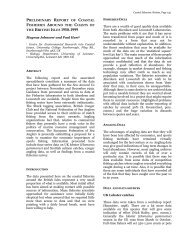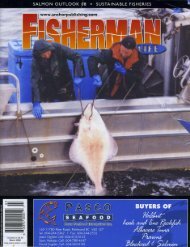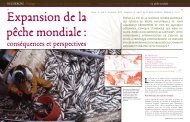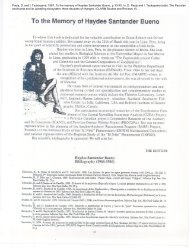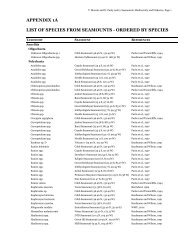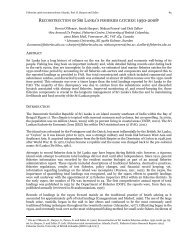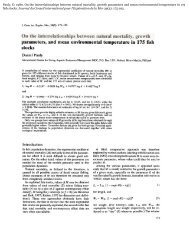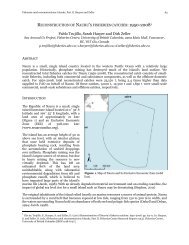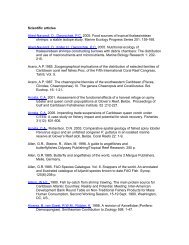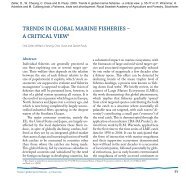Total marine fisheries extractions by country in the Baltic Sea
Total marine fisheries extractions by country in the Baltic Sea
Total marine fisheries extractions by country in the Baltic Sea
Create successful ePaper yourself
Turn your PDF publications into a flip-book with our unique Google optimized e-Paper software.
<strong>Total</strong> <strong>mar<strong>in</strong>e</strong> <strong>fisheries</strong> <strong>extractions</strong> <strong>by</strong> <strong>country</strong> <strong>in</strong> <strong>the</strong> <strong>Baltic</strong> <strong>Sea</strong>: 1950-present, Ross<strong>in</strong>g, Booth and Zeller 245<br />
reported data as per ICES land<strong>in</strong>gs statistics), <strong>the</strong> difference between reconstructed total catches and<br />
reported land<strong>in</strong>gs was 123 %. This implies that <strong>the</strong>re is a larger fraction of IUU catches for ‗less important‘<br />
species, which is an <strong>in</strong>dication of ICES‘ focus on <strong>the</strong> important commercial species, when it comes to<br />
enforcement of report<strong>in</strong>g, and research. While historically potentially justifiable due to <strong>the</strong> focus on<br />
market-based economic development, given <strong>the</strong> recent and future focus on ecosystem-based management,<br />
this focus needs to shift towards comprehensive and <strong>in</strong>clusive account<strong>in</strong>g of total catches, <strong>in</strong>clud<strong>in</strong>g all<br />
IUU and non-commercial catches. It is surpris<strong>in</strong>g that such a shift <strong>in</strong> focus of reported data has not<br />
become evident <strong>in</strong> at least <strong>the</strong> most recent years.<br />
Issues for improvement<br />
The European <strong>fisheries</strong> <strong>in</strong> general are economically stressed, to a large extent due to depleted fish stocks<br />
(Sissenw<strong>in</strong>e and Symes, 2007). Many of <strong>the</strong> problems <strong>in</strong> <strong>the</strong> <strong>Baltic</strong> <strong>Sea</strong> <strong>fisheries</strong> are caused <strong>by</strong> <strong>the</strong><br />
overcapacity that exists <strong>in</strong> <strong>the</strong> fish<strong>in</strong>g fleet (Hildén, 1997). Overcapacity is <strong>the</strong> one of <strong>the</strong> ma<strong>in</strong> reasons for<br />
high IUU catches (Sporrong 2007), and it h<strong>in</strong>ders any move for susta<strong>in</strong>able <strong>fisheries</strong> (Pauly et al. 2002).<br />
The build up of overcapacity <strong>in</strong> <strong>fisheries</strong>, <strong>in</strong> <strong>the</strong> <strong>Baltic</strong> <strong>Sea</strong> as well as globally, is heavily <strong>in</strong>fluenced <strong>by</strong><br />
subsidies <strong>in</strong> <strong>fisheries</strong> policies (Hildén, 1997; Nyström and Andersson, 2007; Sumaila et al., 2007; ICES,<br />
2009). The attempts to decrease fleet overcapacity <strong>by</strong> us<strong>in</strong>g decommission<strong>in</strong>g subsidies have had no, or<br />
even opposite effects. Subsidies for decommission<strong>in</strong>g have globally more often caused an <strong>in</strong>crease fish<strong>in</strong>g<br />
capacity due to modernization of <strong>the</strong> fleet (Pauly et al., 2002), and <strong>in</strong> Sweden <strong>the</strong> capture efficiency<br />
<strong>in</strong>creased <strong>by</strong> 50% from 1995-2002 (Ackefors, 2008). Thus, a key issue to be addressed urgently <strong>by</strong> all<br />
countries <strong>in</strong> Europe, and globally, is a substantial reduction of harmful (from an ecosystem and<br />
overfish<strong>in</strong>g perspective) subsidies (Sumaila et al., 2007).<br />
Complete (100%) observer cover is required for proper, reliable and comprehensive account<strong>in</strong>g of catches<br />
and discards, due to <strong>the</strong> often substantial observer bias effects that are known to skew data with less than<br />
100% coverage (Babcock and Pikitch, 2003; Anon., 2006a; Bremner et al., 2009). The success of full<br />
observer coverage has been demonstrated, for example, on <strong>the</strong> West Coast of Canada, through a<br />
comb<strong>in</strong>ation of onboard observer and video-monitor<strong>in</strong>g (W Erikson, pers. comm., halibut representative,<br />
Commercial Industry Caucus, http://seafoodchoices.org/seafoodsummit/documents/EricksonW.pdf).<br />
Fur<strong>the</strong>rmore, 100% observer cover would enable for a complete buy-<strong>in</strong> <strong>by</strong> <strong>the</strong> <strong>in</strong>dustry (no-one is be<strong>in</strong>g<br />
disadvantaged or preferred) and <strong>in</strong>dustry self-control. The ma<strong>in</strong> counter-argument for a 100% observer<br />
cover has been <strong>the</strong> cost, which should be re-covered from <strong>the</strong> <strong>in</strong>dustry. If cost arguments are seriously<br />
raised <strong>by</strong> <strong>the</strong> <strong>in</strong>dustry, <strong>the</strong>y are likely an <strong>in</strong>dication of economic difficulties, likely due to overcapacity, and<br />
<strong>the</strong> fleet <strong>in</strong> question needs to be reduced. However, 100% observer cover would save some money for<br />
<strong>fisheries</strong> control, which could be used to help f<strong>in</strong>ance <strong>the</strong> coverage. The cost also has to be contrasted to<br />
<strong>the</strong> cost to society of overfished stocks, lost or reduced ecosystem services, and <strong>the</strong> cost of try<strong>in</strong>g to rebuild<br />
<strong>the</strong> <strong>Baltic</strong> <strong>Sea</strong> ecosystem if politics cont<strong>in</strong>ues to ignore scientific advice.<br />
ACKNOWLEDGEMENTS<br />
I would like to thank my supervisor Kjell Leonardsson at SLU Umeå for all his effort, support and valuable<br />
comments, Daniel Pauly and <strong>the</strong> <strong>Sea</strong> Around Us Project for <strong>the</strong> opportunity and f<strong>in</strong>ancial support, my<br />
external supervisor Dirk Zeller for shar<strong>in</strong>g of knowledge, discussion and edit<strong>in</strong>g, and my colleagues Peter<br />
Ross<strong>in</strong>g and Shawn Booth for discussion, cooperation and support. I also thank my contacts <strong>in</strong> Sweden,<br />
Denmark and Canada for shar<strong>in</strong>g <strong>the</strong>ir knowledge; <strong>in</strong> particular H. C. Andersson, D. Boyes, B. Chisena , H.<br />
Degel, W. Erikson, Ö. Eriksson, A. Gårdmark, T. Gustavsson, J. Hjelm, K.-E. Karlsson, P.-O. Larsson, H.<br />
Lassen, J. Löwenadler Davidsson, R. Lundgren, R. Lundström, L. Olofsson, L.-E. Palmén, A. Paulrud, K.<br />
R<strong>in</strong>gdahl, B. Sjöstrand, U. Ste<strong>in</strong>basch, B. Wall<strong>in</strong>, Y. Wal<strong>the</strong>r, and P. Wramner.<br />
REFERENCES<br />
Ackefors, H. 2008. Is it <strong>the</strong> politicians or <strong>the</strong> <strong>fisheries</strong> that control <strong>the</strong> fish<strong>in</strong>g? Kungl. Skogs- och Lantbruksakademiens Tidskrift,<br />
2:36-43, 2008. Available at http://www.ksla.se/ ‖Fiskets kollaps utanför Nordamerika – vad kan Sverige och Europa<br />
lära?‖ accessed 2009-04-05.<br />
Anon. (1952). Year book of <strong>fisheries</strong> statistics 1951. Statistics Sweden. Stockholm 1952. Anon.. 1951-1993. Fisheries statistics.<br />
Statistics Sweden (e.g., Anon. 1952, Anon. 1984, Anon. 2003).<br />
Anon. (1977a). The Swedish people‘s fish<strong>in</strong>g habits.. Swedish M<strong>in</strong>istry of Agriculture. Publication series Ds Jo. 1977:3. Stockholm<br />
1978? ―Svenskarnas fiskevanor‖.



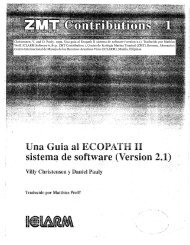

![Nacion.com, San José, Costa Rica [Nacionales] - Sea Around Us ...](https://img.yumpu.com/26166123/1/190x245/nacioncom-san-josac-costa-rica-nacionales-sea-around-us-.jpg?quality=85)
